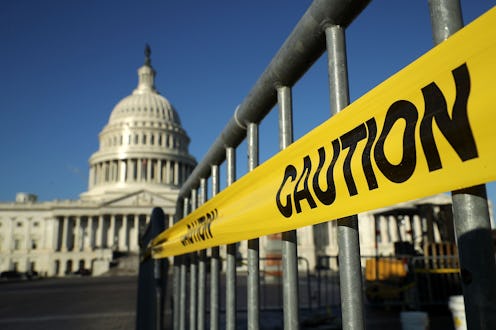News
This Is How Much 20 Years Of Harassment & Discrimination Settlements Has Cost The Senate

Getting information on the particulars of sexual harassment claims in Congress has historically been a challenge. But advocates for more transparency scored a win on Thursday with the Senate Rules Committee's release of financial details from the OCC (Office of Compliance). According to that data, the Senate has spent over $1.45 million in harassment and discrimination settlements over the past 20 years.
The newly public information came in part as a result of pressure from Sen. Tim Kaine, who sent a written request for disclosure of sexual harassment claims to the OCC on Dec. 6. That request was initially rejected, with OCC executive director Susain Tsui Grundmann saying their "ability to respond" was "constrained by the confidentiality provisions of the Congressional Accountability Act" and the "nature of the process" of record keeping.
That process entails no historic data differentiation between sexual harassment claims and "those involving sex-based disparate treatment or pregnancy discrimination." Essentially, the OCC does not have the specific information Kaine was after because they simply haven't kept track of it.
Regardless, Kaine hailed the Thursday release of total settlement payouts in dollars as a "first step" towards accountability. He said the OCC had done the "right thing" for a "more transparent reporting system for harassment in Congress."
Over the past two decades, the $1.45 million spent on sexual harassment and discrimination cases was paid on settlements for senators' offices and Senate-employing offices. There were 13 settlements from claims in senators' offices, resulting in almost $600,000 in total. 10 cases came from Senate-employing offices, which resulted in $853,000 in settlements. That's a total of 23 claims that resulted in a financial settlement.
It's important to note these settlements included all types of discrimination. In fact, a look at the basic classification provided for each settlement reveals only four specifically labeled for "sex discrimination." Other more frequent categories include race discrimination, age discrimination, and disability discrimination.
The list has been criticized as incomplete. For instance, a large sexual harassment settlement of $220,000 made public in 2014 was not included in the OCC's released data.
Much like the convoluted data-keeping process it employs, the OCC itself seems to some as intentionally difficult to navigate. One survey found just 10 percent of women who worked on the Hill able to identify the OCC at all. And before Nov. 17 of this year, sexual harassment and discrimination training were optional for congressional members and their staffs.
The OCC was established in 1995 under a broader push to establish workplace guidelines on the Hill. But its process for handling sexual harassment cases in particular has come under fire from a number of sources.
One of the most vocal critics has been Rep. Jackie Speier. She criticized the OCC in November, saying:
"We have a system in place that allows for the harasser to go unchecked. Doesn't pay for the settlement himself and is never identified. So the Office of Compliance, to which a victim must apply or complain, is a place that has really been an enabler of sexual harassment for these many years because of the way it's constructed."
Indeed, for a victim filing a complaint, the OCC is especially burdensome. First, they must attend 30 days of mandatory counseling, followed by 30 days of mediation alongside the accused. If the number of harassment and discrimination claims seems low, the laborious journey from filing a claim to financial resolution may help explain why.
Some congresspeople are trying to change that. Speier, alongside a group of bipartisan House representatives and senators, have introduced the Me Too Act to reform the OCC.
For transparency advocates, that might very well include making the specifics of sexual harassment and discrimination claims public.